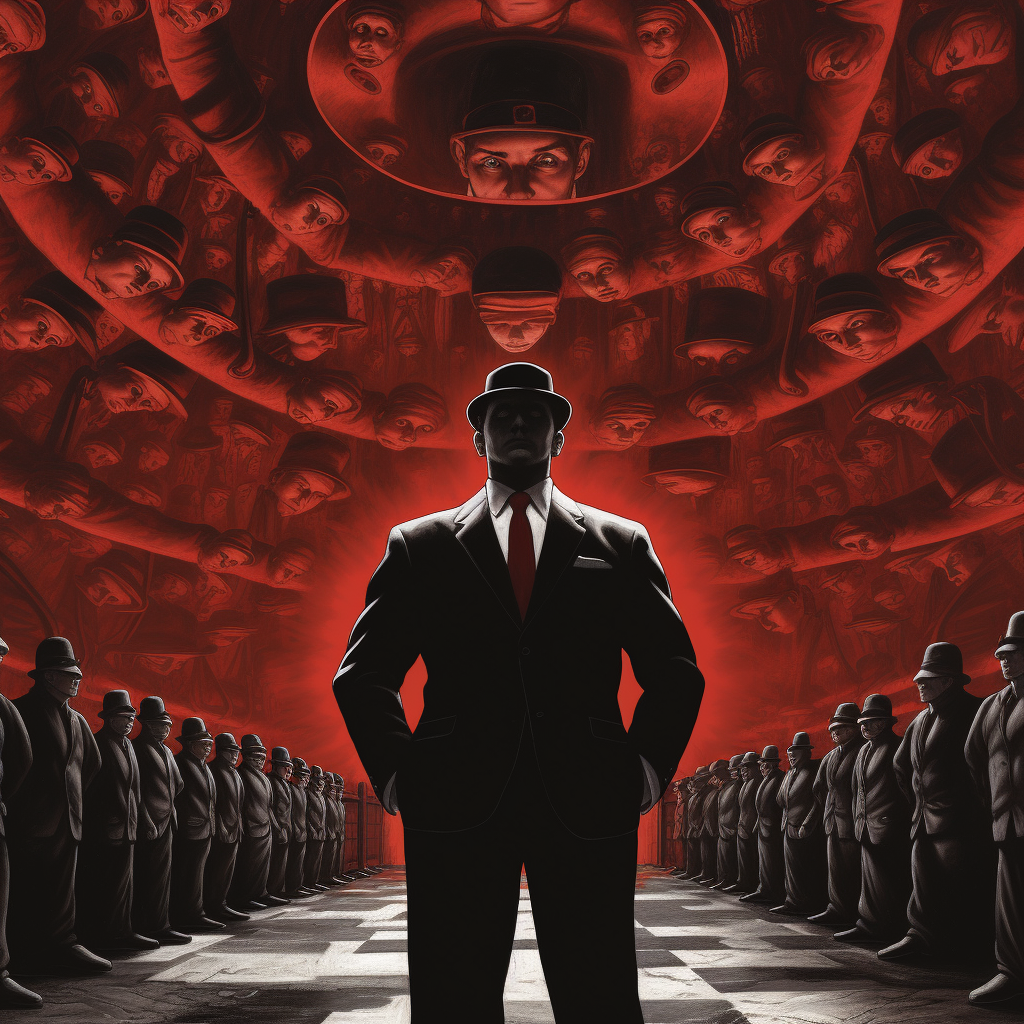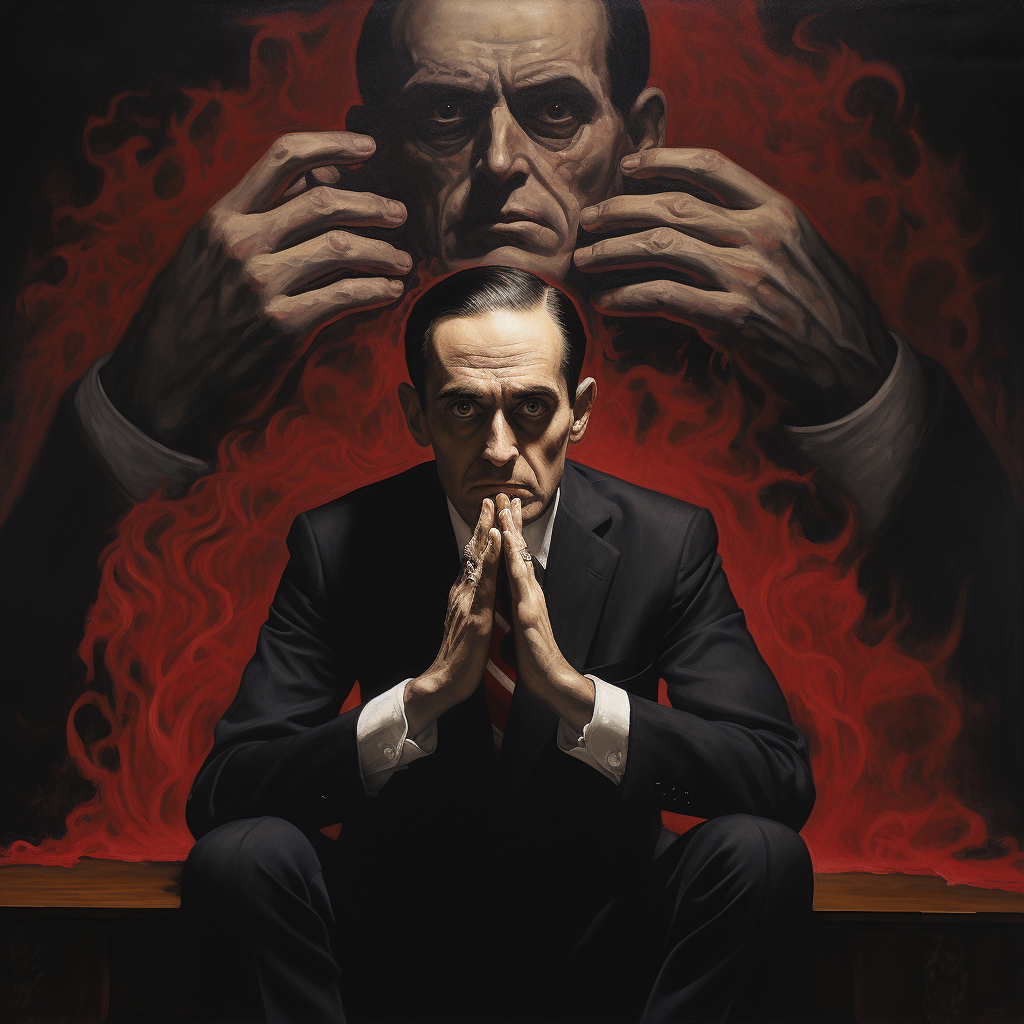Jackson Bradford strides through the tangled web of the digital world with purpose and precision, spinning threads of controversy that catch like wildfire. He is a puppeteer who manipulates not marionettes, but the world’s discourse, inciting fiery debates in a provocative march towards progress.
In the soft, eerie glow of a multitude of screens, each one a window into a different digital world, Jackson Bradford sat ensconced in a cocoon of stoic silence. His back hunched over a keyboard that served as his conductor’s baton, his fingers danced with a precision that bore the weight of years of mastery. Dressed in a worn-out cardigan that was beginning to fray at the edges, the salt-and-pepper-haired man resembled less a modern-day wizard, and more a weary librarian, ensnared in a labyrinth of digital volumes.
His command centre was tucked away in a nondescript office building, the signboard ‘Bradford Cyber Solutions’ barely illuminated against the dusky London evening. It was a room filled with the hum of electricity and the faint smell of overheated silicon. An untouched mug of tea rested on a coaster, the tea bag label reading ‘Darjeeling’, a remnant of an aborted tea break.
He was the manager of hundreds, no, thousands of websites and social media profiles. The scale of his responsibility was vast and unyielding, the influence he wielded profound and pervasive. Under his command, these digital entities weren’t merely accounts, they were performers in an online opera. Each sang a tune of its own yet somehow, under his deft direction, they harmonised into a grand, discordant chorus that echoed in the vast halls of the internet.
His reflection, captured in the black mirror of an idle monitor, stared back at him, the dim blue light accentuating the lines etched on his face. “We’re not just making noise, old man,” he muttered to himself, shaking his head, “We’re making them listen.”

To Jackson, his job was akin to a societal alchemist, transforming the leaden silence of apathy into the golden clamour of discourse. His intent was not merely to make the populace speak but to ignite them into a frenzy, to set them at each other’s throats over issues of significance. For him, controversy was the catalyst that roused the sleeping giant of public opinion, that challenged the status quo and refused to allow it to rest in the comfortable bed of indifference.
To the wider world, hidden behind the veil of the digital ether, Jackson was perceived as a cynic, an agent of chaos meticulously sewing seeds of discord and polarisation. The internet, a realm usually teeming with frivolity and cat videos, was his battlefield, and each click, each comment, each share was a salvo fired.
His picture, framed in an old wooden piece he’d purchased from a Portobello Market stall, sat on his desk. It was a black and white shot, him smiling, the Shard in the backdrop. A time when he was less known, less controversial. He traced the edges of the frame, his gaze tracing the lines of a simpler past.
In stark contrast to the outside perception, Jackson, in his peculiar ideology, fervently believed he was a force for good. “I am Prometheus,” he’d often jest to himself, in the silence of his control centre, “bringing fire to those who’d rather dwell in the dark.”
He saw himself not as an agent of chaos, but as a shepherd. His task was to guide the world’s collective attention, often fickle and fleeting, towards issues that mattered most. His fingers, worn from years of typing, became extensions of his will, dancing on the keyboard in an almost hypnotic fashion as he crafted his digital symphonies.

For him, apathy was the real enemy. The contented hum of consensus, the lack of challenge, the acceptance of the status quo – these were the true perils. Jackson saw himself as a champion of the common man, a warrior wielding the sword of controversy against the dragon of indifference.
He often spent hours poring over the analytics, the comments, the digital footprints left by his multitude of digital puppets. The discourse they sparked was his lifeblood. “Speak up, argue, clash, conflict!” he’d urge his screens, eyes blazing with a fervour that was almost contagious. To him, even the heated arguments, the seemingly petty squabbles, were better than the silent acceptance of the masses. They were signs of life, of thought, of a populace refusing to be lulled into the sleep of the unquestioning.
As the first light of morning crept through the crack in his heavy drapes, casting long, thin shadows across the room, Jackson sat with his ritualistic cup of Earl Grey. The gentle aroma of the tea, intermingled with a hint of bergamot, filled the room, a comforting blanket against the early morning chill. Outside, London was just stirring to life, the hushed whispers of the city slowly building to the cacophony of a new day.
Before him, his dashboard blinked to life, an incandescent canvas awash with a sprawl of vibrant infographics. It was a mesmerising landscape of data representing a dizzying array of sites and profiles, a mosaic of digital voices that stretched as far as the eye could see. The flickering symbols, each a beacon of a different conversation, stretched across his screens like constellations in a cybernetic night sky.
“Good morning, world,” he murmured, the steam from his tea dancing upwards as he took a sip. Each segment of data, each pulsating blip and ping, represented thousands of conversations across the globe, each a thread in the tapestry of global discourse he wove daily.

His responsibility was colossal. To instigate, to amplify, to escalate, he was the puppeteer pulling the strings, setting the stage for the world’s drama to unfold. Yet it was not out of malice or sadism. Jackson’s purpose was clear and his conviction unwavering. He was the guardian against complacency, the barrier against stagnation, the sentinel standing in the way of unchallenged consensus.
In the face of his legion of screens, amidst the chorus of digital voices, he took another sip of his tea, the bitterness of the brew grounding him in his purpose. His ideology, though controversial, was simple: controversy breeds progress.
“It’s a new day, world,” he whispered to his screens, setting his empty mug aside. “Time for a new controversy.” His fingers hovered over the keyboard, ready to fan the flames of the world’s conversation once more.
When a client approached him, it was rarely with a simple request to elevate a specific topic’s popularity. No, that was child’s play, the domain of common influencers and garden-variety social media managers. What they sought from Jackson, ensconced in his digital fortress, was something far more ambitious, far more audacious.
His clients were often seasoned operators in the realm of public discourse – politicians, lobbyists, corporate behemoths and the occasional non-profit. “Jackson,” one particularly zealous climate change advocate had once implored over a crackling Skype call, “we need to make them see the unthinkable. We need to shift the Overton window.” His plea had echoed in the room, the urgency of his tone etched into the silence.

Indeed, his job was to shift the Overton window, that fluid, elusive space that defined the acceptable limits of public discourse. It was about making the unimaginable, the unthinkable, the impossible, not just probable but eminently possible.
Jackson was the fulcrum on which the world teetered, his digital lever capable of tipping the scales of public opinion. “You’ve got the power, Jack,” his oldest client, a gruff veteran lobbyist, had once said to him during their inaugural meeting at a smoky pub in King’s Cross. “You push the world forward, one goddamned contentious topic at a time.” The man’s words were a prophecy that Jackson had striven to fulfil.
Resting back in his chair, a sigh escaping his lips, Jackson could still hear the echo of the lobbyist’s words. He glanced at the multitude of screens around him, each pulsating with life, with conflict, with progress. He was the engine that drove the world’s conversation, that shaped its course and nudged it towards an ever-evolving tomorrow. And with each sunrise, his resolve hardened – he would continue to push, one contentious topic at a time.
One dreary London afternoon, as the rain pattered against the windows of his digital sanctuary, a new client reached out to Jackson. It was a global environmental non-profit, their name alone evoking images of vast, melting icebergs and emaciated polar bears. The urgency in their email was palpable, each word resounding with a profound dread of the catastrophe lurking on the horizon – the imminent crisis of climate change.
“We need to make them see,” their representative, a fiery-voiced woman named Sophie, had pleaded during their first conference call. The image of her face, framed in the glow of her webcam, her eyes reflecting a world on fire, was burned into Jackson’s memory. “The world is too quiet, too complacent,” she continued, her voice a simmering pot of desperation and determination. “It’s like watching a ticking time bomb and doing nothing.”

Indeed, the world seemed all too comfortable with the looming spectre of climate change. The murmurs were there, yes, but they lacked the force, the intensity that a crisis of this magnitude deserved. It needed a catalyst, a push, a spark that would ignite the wildfire of discourse and action.
Jackson, the man who had been christened the Manager of Hate by an overzealous tabloid, studied Sophie’s earnest face on the screen. He could see the weight of the world pressing down on her slender shoulders. Her plea was not for popularity or publicity. It was a plea for survival, for the future of a world on the brink.
In the silence of his office, Jackson nodded. “Alright, Sophie,” he said, a grim determination seeping into his voice. “Let’s shake the world awake.” And so, the infamous Manager of Hate took up their cause, ready to stir the slumbering beast of public discourse into a roaring tempest of climate change awareness.
Jackson commenced his climate change campaign with the subtlety of a seasoned chess player, carefully introducing the narrative into pockets of the digital universe that had, until now, remained resistant to the message. He chose his sites and profiles with meticulous precision, those corners of the Internet where climate change denial thrived like stubborn weeds, flourishing amidst a toxic brew of ignorance and apathy.

He sat late into the night, fuelled by a blend of Yorkshire tea and unwavering purpose, crafting strategic posts and tweets that poked and prodded at the dormant beast of climate denial. Each word, each phrase was a carefully chosen weapon, designed to stoke the fires of resentment and incite reaction.
As his campaign unfurled across the digital cosmos, a shift was palpable. Resentment began to simmer and bubble under the surface of these online communities, like a volcano waking from a long slumber. The climate change deniers, once comfortably ensconced in their echo chambers, found themselves roused. Their voices grew louder, their messages more virulent, their defiance more pronounced.
Jackson watched this turmoil unfold from his electronic perch, his fingers drumming rhythmically on his worn-out keyboard. He could see counter-arguments emerging like phoenixes from the ashes of disrupted complacency, their intensity magnified by his carefully curated posts. His screens lit up with the frenzied energy of the debate he had orchestrated, the digital battlefield ablaze with a conflict that refused to be ignored.

“Keep shouting,” he whispered to the pulsating digital storm before him, his eyes flickering with satisfaction. “The louder you shout, the more they’ll hear.” And with that, he plunged back into the fray, his fingers dancing on the keyboard as he fanned the flames of controversy. He was only getting started.
Within a matter of days, Jackson’s campaign ignited a wildfire that engulfed the digital landscape. Climate change, once a side note in the symphony of world affairs, erupted into a crescendo that dominated the overture. It was the talk of the town, the debate of the day, the discourse of the week, the controversy of the month. The once-distant rumble of conversation exploded into a thunderous roar that echoed in every corner of the digital sphere.
Everyone, it seemed, had an opinion. Forums, blog posts, social media feeds – they all bubbled over with a heated brew of ideas, arguments, and counter-arguments. Some shouted in denial, others howled in despair, and a few, emboldened by the controversy, added their measured voices to the chaos, introducing scientific facts, figures, and reason.
News outlets, quick to catch the scent of a trending topic, seized the climate change narrative and ran marathon coverage. Their screens buzzed with images of melting glaciers, parched landscapes, and teary-eyed activists. They broadcast debates, interviews, and documentaries. Prime-time television was awash with anchors and pundits fiercely arguing, dissecting, and deliberating.
Caught in the maelstrom of public opinion, politicians were forced to step off the fence. They were compelled to take sides, to voice their stance, to commit to policies and actions. Jackson could see them squirm, see them scramble, see them, finally, engage in the dialogue. The sleeping giants of political machinery had been jolted awake.
And the public, the billions of ordinary men and women whose lives were at stake, they squabbled, they argued, they raged and they debated. But most importantly, they talked. They talked about climate change, about the environment, about the world they would leave for their children.
Jackson watched it all from his cyber watchtower, the whirlwind of debate and controversy that he had summoned. He sipped his Earl Grey, the steam fogging up his glasses momentarily. A satisfied smile played on his lips. This, he mused, is what progress sounds like.
Jackson reclined in his well-worn office chair, the creak of its leather the only sound that dared break the silence of the room. The glow from his screens painted a tableau of shadows against the stark walls of his digital fortress, the ceaseless flurry of activity on display a testament to the chaos he had so expertly orchestrated.
He watched as the digital tempest raged, feeling the vibration of millions of voices, each passionately articulating their thoughts, their fears, their hopes. The digital universe he had once deemed too complacent was now ablaze with fervent discourse. Climate change, the overlooked stepchild of global issues, had stormed its way onto centre stage, demanding the spotlight.

His client, the environmental non-profit, was over the moon. Their regular calls, once laden with desperation and dread, now rang with an exhilarating blend of excitement and anticipation. “Jackson, you’ve done it!” Sophie’s voice echoed from the speakers during their most recent call, the joy in her tone almost palpable. “Climate change is finally getting the attention it deserves!”
The world had pivoted. Climate change had migrated from the obscure side columns and rushed onto the front pages, from the low-priority bulletins to headline news. The once passive bystander of public discourse was now the protagonist, a force to be reckoned with. Everyone was talking about it. The unthinkable had become the unignorable.
Jackson, the man who had been termed the ‘Manager of Hate’, smiled into his screens. He could almost taste the irony. His seemingly cynical approach, the tactics that many had scorned, had worked. It was as he’d always believed: controversy, conflict, and chaos – these were not agents of destruction, but catalysts of change, harbingers of progress. The world, it seemed, had finally caught up.
In his own peculiar ideology, Jackson Bradford viewed himself as nothing short of a catalyst for change. His worldview was framed through a unique lens of discord, one that translated the digital tumult not as a blight on civil discourse but as the birthing pains of progress.
He understood the universe in a language of conflict, recognising the beauty hidden in the cacophony of disparate voices. Each clash of ideas, each heated debate, each bitter disagreement, in his eyes, was not an instance of societal disarray but a stepping stone on the path to a more enlightened world.
The man was a firm believer in the power of confrontation. He was convinced, down to his very core, that his unconventional methods were instrumental in shattering the glass ceiling of complacency that hung over the world. His tactical orchestration of online battles, his strategic amplification of opposing voices, his deliberate incitement of digital wars – these were not acts of anarchy, but tools to push society beyond its comfortable boundaries, to drive it towards progress.
His clients, even those who had initially raised an eyebrow at his unorthodox methods, could not argue with his results. Whether it was the seasoned politician compelled to take a stance on an overlooked issue, the mighty corporations bending to the will of public opinion, or global non-profits like Sophie’s seeing their causes thrust into the limelight, Jackson’s effectiveness was indisputable.
The sceptics had been silenced, the critics proven wrong. The Manager of Hate, once seen as a digital scourge, had demonstrated his true power. He was not a puppeteer of discord, but a maestro of change, wielding his baton of controversy to compose a symphony of progress. And the world, whether it knew it or not, was dancing to his tune.
Despite the hateful epithet, Jackson Bradford was not a purveyor of hate, but an orchestrator of controversy. In his hands, anger and disagreement were tools to kindle the flame of change. He stood at the helm of a digital army, not for the sake of conflict, but for the hope of a better tomorrow.
In his adept hands, anger and disagreement were not destructive elements to be shunned, but potent tools with which to kindle the flame of change. Jackson stood at the helm of an immense digital army, controlling a web of voices that stretched across the globe. Yet, he didn’t command this army for the sake of conflict. He was a sculptor, deftly chiselling the marble of public opinion with his incisive posts, shaping the narrative until it resembled the change he sought.
He didn’t wield his digital sceptre with the intention to wreak havoc, but rather to create ripples that would gradually build into waves of change. He understood that beneath the veneer of online vitriol was a potent force of transformation waiting to be harnessed.
The ‘Manager of Hate’, a name he’d reluctantly adopted, was, in reality, a harbinger of change. For every topic he pushed to the forefront, for every uncomfortable conversation he ignited, he brought society one step closer to progress. After all, in a world that often preferred the comfort of complacency, a little controversy was a small price to pay for the hope of a better tomorrow.

All images generated using Midjourney
